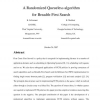Free Online Productivity Tools
i2Speak
i2Symbol
i2OCR
iTex2Img
iWeb2Print
iWeb2Shot
i2Type
iPdf2Split
iPdf2Merge
i2Bopomofo
i2Arabic
i2Style
i2Image
i2PDF
iLatex2Rtf
Sci2ools
112
click to vote
ISCA
2008
IEEE
2008
IEEE
A Randomized Queueless Algorithm for Breadth-First Search
First Come First Served is a policy that is accepted for implementing fairness in a number of application domains such as scheduling in Operating Systems [28, 11], scheduling web requests and so on. We also have orthogonal applications of FCFS policies in proving correctness of search algorithms such as Breadth-First Search and the Bellman-Ford FIFO implementation for finding single-source shortest paths [2], program verification [12] and static analysis [25, 24]. The principal data structure used in implementing FCFS policies is the queue, which is realized either through a circular array or a linked list. The question of interest then, is whether queues are required to implement FCFS policies; this paper provides empirical evidence answering this question in the negative. The principal contribution of this paper is the development of a randomized algorithm to implement approximate FCFS policies without queues. The
Bellman-Ford FIFO Implementation | FCFS Policies | Hardware | ISCA 2008 | Single-source Shortest Paths |
Related Content
| Added | 12 Dec 2010 |
| Updated | 12 Dec 2010 |
| Type | Journal |
| Year | 2008 |
| Where | ISCA |
| Authors | K. Subramani, Kamesh Madduri |
Comments (0)

